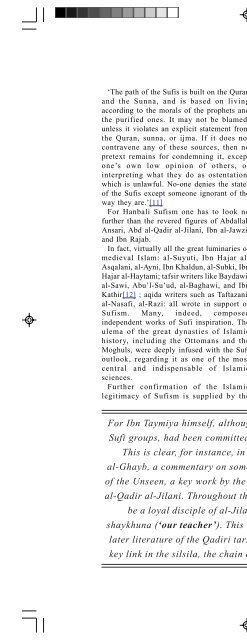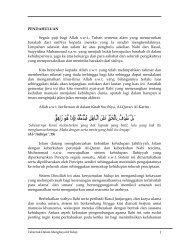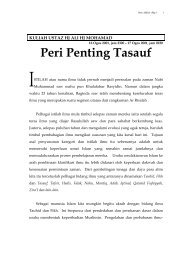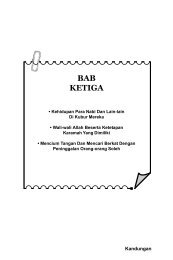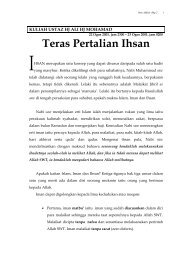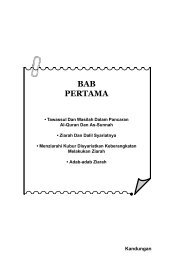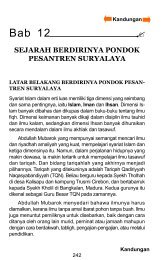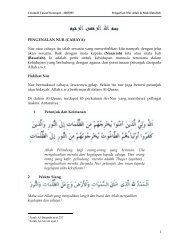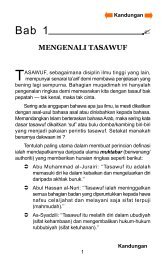inab3 cover front.psd - Khadijah Mosque
inab3 cover front.psd - Khadijah Mosque
inab3 cover front.psd - Khadijah Mosque
Create successful ePaper yourself
Turn your PDF publications into a flip-book with our unique Google optimized e-Paper software.
‘The path of the Sufis is built on the Quran<br />
and the Sunna, and is based on living<br />
according to the morals of the prophets and<br />
the purified ones. It may not be blamed,<br />
unless it violates an explicit statement from<br />
the Quran, sunna, or ijma. If it does not<br />
contravene any of these sources, then no<br />
pretext remains for condemning it, except<br />
one’s own low opinion of others, or<br />
interpreting what they do as ostentation,<br />
which is unlawful. No-one denies the states<br />
of the Sufis except someone ignorant of the<br />
way they are.’[11]<br />
For Hanbali Sufism one has to look no<br />
further than the revered figures of Abdallah<br />
Ansari, Abd al-Qadir al-Jilani, Ibn al-Jawzi,<br />
and Ibn Rajab.<br />
In fact, virtually all the great luminaries of<br />
medieval Islam: al-Suyuti, Ibn Hajar al-<br />
Asqalani, al-Ayni, Ibn Khaldun, al-Subki, Ibn<br />
Hajar al-Haytami; tafsir writers like Baydawi,<br />
al-Sawi, Abu’l-Su’ud, al-Baghawi, and Ibn<br />
Kathir[12] ; aqida writers such as Taftazani,<br />
al-Nasafi, al-Razi: all wrote in support of<br />
Sufism. Many, indeed, composed<br />
independent works of Sufi inspiration. The<br />
ulema of the great dynasties of Islamic<br />
history, including the Ottomans and the<br />
Moghuls, were deeply infused with the Sufi<br />
outlook, regarding it as one of the most<br />
central and indispensable of Islamic<br />
sciences.<br />
Further confirmation of the Islamic<br />
legitimacy of Sufism is supplied by the<br />
enthusiasm of its exponents for carrying<br />
Islam beyond the boundaries of the Islamic<br />
world. The Islamization process in India,<br />
Black Africa, and South-East Asia was carried<br />
out largely at the hands of wandering Sufi<br />
teachers. Likewise, the Islamic obligation of<br />
jihad has been borne with especial zeal by<br />
the Sufi orders. All the great nineteenth<br />
century jihadists: Uthman dan Fodio<br />
(Hausaland), al-Sanousi (Libya), Abd al-<br />
Qadir al-Jaza’iri (Algeria), Imam Shamil<br />
(Daghestan) and the leaders of the Padre<br />
Rebellion (Sumatra) were active practitioners<br />
of Sufism, writing extensively on it while on<br />
their campaigns. Nothing is further from<br />
reality, in fact, than the claim that Sufism<br />
represents a quietist and non-militant form<br />
of Islam.<br />
With all this, we con<strong>front</strong> a paradox. Why<br />
is it, if Sufism has been so respected a part<br />
of Muslim intellectual and political life<br />
throughout our history, that there are,<br />
nowadays, angry voices raised against it?<br />
There are two fundamental reasons here.<br />
Firstly, there is again the pervasive<br />
influence of Orientalist scholarship, which,<br />
at least before 1922 when Massignon wrote<br />
his Essai sur les origines de la lexique<br />
technique, was of the opinion that something<br />
so fertile and profound as Sufism could never<br />
have grown from the essentially ‘barren and<br />
legalistic’ soil of Islam. Orientalist works<br />
translated into Muslim languages were<br />
influential upon key Muslim modernists -<br />
For Ibn Taymiya himself, although critical of the excesses of certain<br />
Sufi groups, had been committed to a branch of mainstream Sufism.<br />
This is clear, for instance, in Ibn Taymiya’s work Sharh Futuh<br />
al-Ghayb, a commentary on some technical points in the Revelations<br />
of the Unseen, a key work by the sixth-century saint of Baghdad, Abd<br />
al-Qadir al-Jilani. Throughout the work Ibn Taymiya shows himself to<br />
be a loyal disciple of al-Jilani, whom he always refers to as<br />
shaykhuna (‘our teacher’). This Qadiri affiliation is confirmed in the<br />
later literature of the Qadiri tariqa, which records Ibn Taymiya as a<br />
key link in the silsila, the chain of transmission of Qadiri teachings.<br />
Masjid <strong>Khadijah</strong> 61


